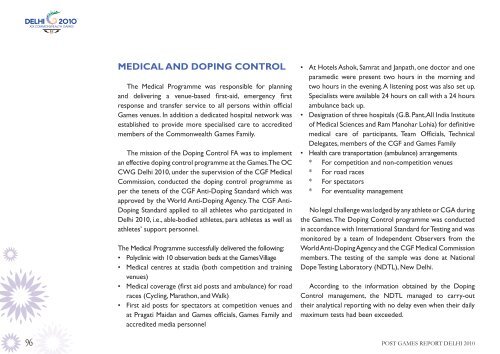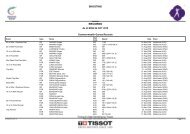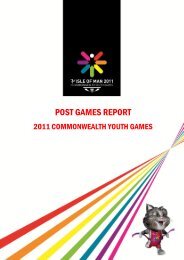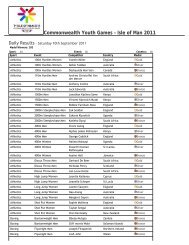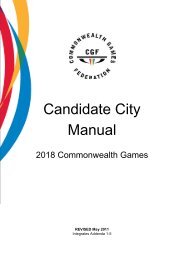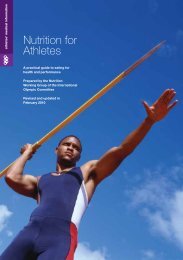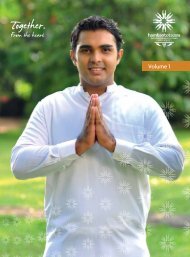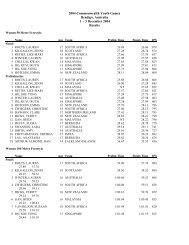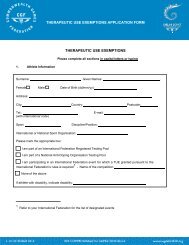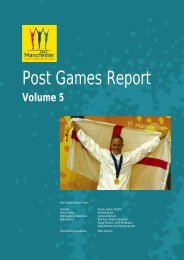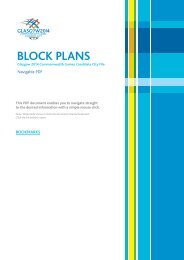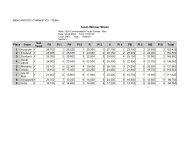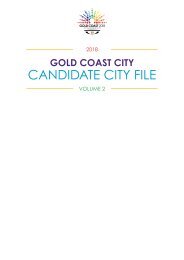POST GAMES REPORT - Commonwealth Games Federation
POST GAMES REPORT - Commonwealth Games Federation
POST GAMES REPORT - Commonwealth Games Federation
Create successful ePaper yourself
Turn your PDF publications into a flip-book with our unique Google optimized e-Paper software.
MEDICAL AND DOPING CONTROL<br />
The Medical Programme was responsible for planning<br />
and delivering a venue-based first-aid, emergency first<br />
response and transfer service to all persons within official<br />
<strong>Games</strong> venues. In addition a dedicated hospital network was<br />
established to provide more specialised care to accredited<br />
members of the <strong>Commonwealth</strong> <strong>Games</strong> Family.<br />
The mission of the Doping Control FA was to implement<br />
an effective doping control programme at the <strong>Games</strong>. The OC<br />
CWG Delhi 2010, under the supervision of the CGF Medical<br />
Commission, conducted the doping control programme as<br />
per the tenets of the CGF Anti-Doping Standard which was<br />
approved by the World Anti-Doping Agency. The CGF Anti-<br />
Doping Standard applied to all athletes who participated in<br />
Delhi 2010, i.e., able-bodied athletes, para athletes as well as<br />
athletes’ support personnel.<br />
The Medical Programme successfully delivered the following:<br />
• Polyclinic with 10 observation beds at the <strong>Games</strong> Village<br />
• Medical centres at stadia (both competition and training<br />
venues)<br />
• Medical coverage (first aid posts and ambulance) for road<br />
races (Cycling, Marathon, and Walk)<br />
• First aid posts for spectators at competition venues and<br />
at Pragati Maidan and <strong>Games</strong> officials, <strong>Games</strong> Family and<br />
accredited media personnel<br />
• At Hotels Ashok, Samrat and Janpath, one doctor and one<br />
paramedic were present two hours in the morning and<br />
two hours in the evening. A listening post was also set up.<br />
Specialists were available 24 hours on call with a 24 hours<br />
ambulance back up.<br />
• Designation of three hospitals (G.B. Pant, All India Institute<br />
of Medical Sciences and Ram Manohar Lohia) for definitive<br />
medical care of participants, Team Officials, Technical<br />
Delegates, members of the CGF and <strong>Games</strong> Family<br />
• Health care transportation (ambulance) arrangements<br />
* For competition and non-competition venues<br />
* For road races<br />
* For spectators<br />
* For eventuality management<br />
No legal challenge was lodged by any athlete or CGA during<br />
the <strong>Games</strong>. The Doping Control programme was conducted<br />
in accordance with International Standard for Testing and was<br />
monitored by a team of Independent Observers from the<br />
World Anti-Doping Agency and the CGF Medical Commission<br />
members. The testing of the sample was done at National<br />
Dope Testing Laboratory (NDTL), New Delhi.<br />
According to the information obtained by the Doping<br />
Control management, the NDTL managed to carry-out<br />
their analytical reporting with no delay even when their daily<br />
maximum tests had been exceeded.<br />
96<br />
<strong>POST</strong> <strong>GAMES</strong> <strong>REPORT</strong> DELHI 2010


